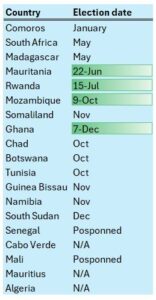Nouakchott, May 7, 2020 - The West African desert state of Mauritania has scaled back two-month-old restrictions aimed...

With MondAfrique
The island nation of Comoros on the Indian ocean is the first African nation to inaugurate the election season on the  African continent. And if the Comoros island is an example of what’s to come, Africa’s elections are going to count for nothing, with a few notable exceptions.
African continent. And if the Comoros island is an example of what’s to come, Africa’s elections are going to count for nothing, with a few notable exceptions.
In the Comoros, the incumbent President Azali Assoumani was declared on the 16 January 2024, the winner of rigged elections that triggered riots. As of January 18, Comoros witnessed a second day of turmoil resulting in one fatality and at least six injuries. Opposition parties contested the election results, alleging fraud and bias in favor of Assoumani, who, having changed the constitution in 2018 to bypass term limits, secured a fourth term with 62.97% of the vote. Accusations of dissent crackdown and protest bans were leveled against Assoumani, who also chairs the African Union.
President Assoumani and the Comoros are a template of what African politics looks like. African leaders have no interest in quitting their presidential seats without upheaval. Aside from some exceptions, there is no such thing as smooth presidential transition. Assoumani of the Comores has been in power since 1999.
So 2024 should be a record election year for Africa. Twenty countries, accounting for 346 million voters will be called to participate to elections that will mostly be rigged and decided in advance.
However, for those of you who live un western nations and where elections are the backbone of governance, it is worth noting that Africa has long been looking to distance itself from western-style democracy. Our colleagues from MondAfrique noted, rightly so, the for the most part, the forthcoming African elections have no democratic content and standards in them, citing the fact that different factors and actors have a more direct impact on the political systems in those countries. Among the factors cited by MondAfrique is the predominant role of the military in several countries like Mali, Niger and Guinea, the strength of traditional tribal structures, the rise of Islamic values favoring tradition over the law or finally the positive image of Vladimir Putin among many of African heads of state, factors that naturally clash with Western democratic values.
So of course, Africa does not have to mimic the west. It can create its own political model. But should we be pleased that a handful of ruthless rulers and their backers will win elections in advance? Not at all. Here is a snapshot of what to expect this year as African experience another election cycle.

Nouakchott, May 7, 2020 - The West African desert state of Mauritania has scaled back two-month-old restrictions aimed...

Rome, May 7, 2020 - The European Union has launched a delayed naval mission to enforce an arms embargo on Libya, the...

Algiers, May 7, 2020 (By Abdelhafid Daamache) - North Africans say they are missing the taste of Ramadan, as...
Template not found:
N'Djamena, May 6, 2020 - Chad's capital N'Djamena will be isolated from the rest of the country for two weeks from...
Istanbul, May 4, 2020 - Turkey will relax confinement rules on people aged 65 and over, and those under 20, as the...
Abuja, May 5, 2020 - Oil-rich Nigeria is losing more than 80 percent of its revenue due to plummeting oil prices and...
Rabat, May 6, 2020 - Morocco has rapidly expanded its fleet of drones as it battles the coronavirus pandemic,...
Kano, Nigeria, May 6, 2020 - A group of coronavirus patients staged a protest outside an isolation centre in northern...
Abuja, May 6, 2020 - Nigeria on Wednesday was to start repatriating nationals stranded overseas by coronavirus travel...
The Algerian government decided Sunday to reduce the state budget by half due to a financial crisis caused by the...
Niamey, May 4, 2020 - The novel coronavirus caused the death of Niger's minister of employment and labour, Mohamed Ben...
Lagos, May 4, 2020 - Africa's biggest city, Lagos, got back to work on Monday at the end of a five-week coronavirus...
Lagos, May 5, 2020 - A Nigerian court sentenced a man to death in the country's first ever virtual ruling during a...
Niamey, May 5, 2020 - Boko Haram fighters clashed with government forces on Sunday in Diffa, the largest city in...
Kuwaiti authorities dispersed a "riot" by Egyptian workers who demonstrated on Monday to demand repatriation amid the...
Kano, Nigeria, May 4, 2020 - Mass deaths in a northern Nigerian state were caused by coronavirus, the authorities said...
Cairo, May 3, 2020 - Egypt's interior ministry said Sunday 18 suspected militants were killed in North Sinai in a...
Tunis, April 29, 2020 - Tunisian officials on Wednesday announced a partial easing of lockdown measures in place to...
Bamako, April 30, 2020 - The UN mission in Mali on Thursday blamed Malian and Niger troops for scores of...
Template not found:
Template not found:
Cairo, April 30, 2020 - Egypt's army said on Thursday that 10 soldiers were either killed or wounded in a blast...